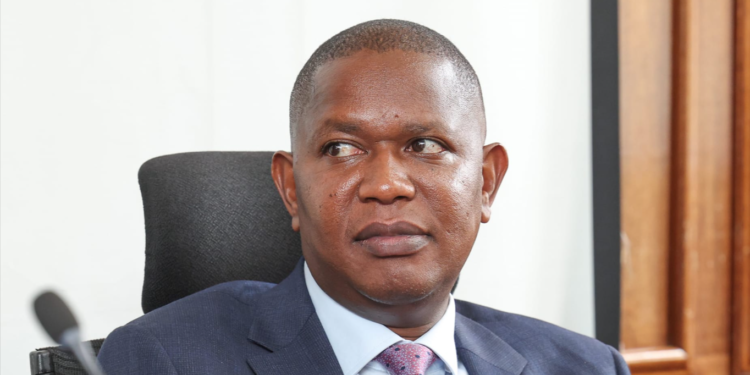The Senate session on the impeachment motion of Deputy President Rigathi Gachagua took a dramatic turn when Kibwezi MP Mwengi Mutuse, the mover of the motion, faced an intense cross-examination by Gachagua’s legal team. The normally composed MP struggled to respond under pressure, leading to a tense and heated affair.
The cross-examination, led by Gachagua’s lawyer, Elisha Ongoya, exposed glaring gaps in Mutuse’s evidence, leaving him visibly rattled.
The session, which took place in the presence of a packed Senate chamber, saw Mutuse, a trained lawyer, sweating through a barrage of tough questions. His answers, often evasive or incomplete, were met with persistent follow-ups from Ongoya, as Gachagua’s team worked meticulously to discredit the claims put forth in the impeachment motion.
Mutuse, who had previously confidently presented the motion in the National Assembly, appeared less sure-footed as Ongoya, with a commanding presence, grilled him on several points. One of the most notable moments came when Ongoya questioned the validity of the allegations Mutuse had made against Gachagua concerning his interference with a High Court judge.
“Honorable Mutuse, in your allegations, you claim that the Deputy President made false allegations against a High Court judge and failed to present a petition to the Judicial Service Commission by September 2024. Do you still stand by that?” Ongoya asked.
Mutuse, initially standing firm on his earlier claims, was forced to backtrack. “I have since learned that the petition was indeed presented,” Mutuse admitted after repeated probing from Ongoya, acknowledging that part of the evidence he had relied on was no longer accurate.
The struggle for Mutuse did not end there. Ongoya, maintaining a relentless pace, moved to the next point of contention – allegations that Gachagua had influenced family members to take control of a cooperative society in Madaraka and that the Deputy President was involved in a series of financial misdeeds. However, when pressed on specifics, Mutuse was unable to provide clear evidence.
“You claim that Gachagua’s proxies have taken over the cooperative society and are financially hemorrhaging it. Do you have any names of these proxies or any concrete evidence of this claim?” Ongoya pressed.
Mutuse, visibly flustered, attempted to redirect the conversation, stating, “It is up to the Senate to determine the extent of influence the Deputy President has.” However, Ongoya’s line of questioning persisted, and Mutuse eventually admitted that he had no direct evidence to substantiate the claim.
As the cross-examination continued, Gachagua’s lawyers systematically deconstructed the arguments put forth by Mutuse. When asked whether Mutuse had filed any formal complaints against the officials of the Asset Recovery Agency, as he had alleged in the motion, Mutuse conceded that he had not done so.
“No, I have not lodged any complaint,” he answered, a response that further undermined the credibility of his case.
Ongoya also sought to challenge Mutuse’s claims of corruption within Kenya’s tea sector, an allegation Mutuse had attributed to Gachagua’s interference with the Kenya Tea Development Agency (KTDA). When asked whether Mutuse had presented any complaints or grievances from the KTDA as part of his evidence, the MP admitted that he had not.
“I have not included that in the motion,” Mutuse responded.
Throughout the grilling, the tension in the room was palpable. Mutuse, who started confidently, was reduced to offering half-hearted responses, often needing to pause and rethink his answers. His discomfort was evident, with the cross-examination pushing him into a corner from which he struggled to escape.
One of the defining moments of the cross-examination was when Mutuse was asked about a video that had been played earlier in the session, showing Gachagua discussing the eviction of residents along Nairobi River. Ongoya questioned Mutuse’s interpretation of the video, specifically Gachagua’s call for empathy toward those affected.
“Do you have any problem with the Deputy President calling for empathy during the evictions?” Ongoya asked pointedly.
Mutuse hesitated before responding, “I have no problem with the call for empathy, but I believe it was the wrong forum for such a statement.”
This response further weakened Mutuse’s argument, as Ongoya pointed out that there was no law prohibiting the Deputy President from making such a statement in a public forum, especially in a press conference.
As the cross-examination drew to a close, it became clear that the defense team had successfully poked holes in the impeachment case. Mutuse, who had earlier appeared confident of his case against Gachagua, was left sweating, both figuratively and literally, under the intense pressure of the examination.
For Gachagua and his legal team, the session marked a significant turning point, with their strategy of systematically dismantling the accusations appearing to pay off. However, the final decision rests with the Senate, which will deliberate on the evidence presented later today.












